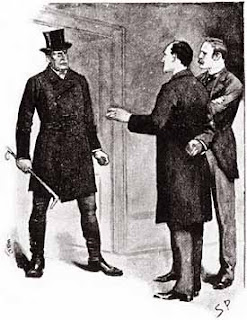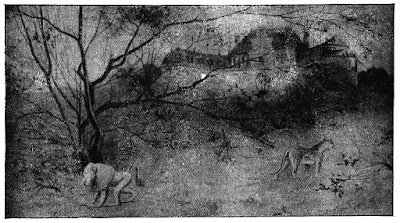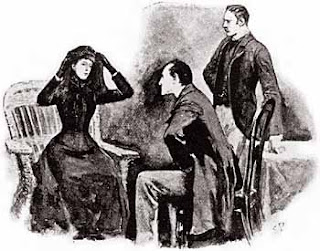If you've read a Sherlockian discussion on Twitter of Facebook, the name of this week's Interesting Interview will be familiar to you! Howard Ostrom is probably the most knowledgeable guy out there when it comes to Sherlockian performers. And when someone has a question about a play, movie, television series, or YouTube video he's often there to help out.
It seems like I've know Howard since I signed on to the Sherlockian Internet, but I really came to appreciate him when he contributed a chapter to The Finest Assorted Collection, where he detailed his transformation from autograph collector to chronicler of performers. His obsession, er I mean passion has collected THOUSANDS of folks who have ventured into the sphere of performers. But now it's time to turn the lens on Howard himself, and see how he enjoys this hobby of ours!
How do you define the word “Sherlockian”.
My definition would be way looser than most others. Simply a
Shelockian (or Holmesian) is anyone who enjoys the character or enjoys the
author, be it scholarly or has a fan.
They can write scholarly papers about him, or simply don a deerstalker,
or perhaps more so today cosplay wearing Cumberbatch’s coat and scarf combo, or
make a fan video, or be in a legion of zoom, or sing about him, or, design
fashions based on him, there is only one requirement for me for being a
Sherlockian, they must be good company and always have fun with it.
How did you become a Sherlockian?
I used to answer that question with two responses. I was quite a reader as a young boy, and after reading and liking my older sister’s Nancy Drew books, the local librarian suggested I try the Hardy Boys and/or Sherlock Holmes. I loved Holmes, the Hardy boys not so much. So when my parents got their first TV, the Basil Rathbone/Nigel Bruce films were always on in New York and I was really hooked.
However, now I realize through all the research I’ve done on Sherlock Holmes in the media that a sublime Holmes image may have already been planted in my mind from the many things I actually witnessed him in, even prior to those early occurrences. Learning that the TV shows, cartoons, and comic books I watched and read almost all had a Sherlock Holmes type character in them may be actually where I first came to appreciate the detective.
I can give you many examples, but to keep it short here are just a few
examples. Kukla had dressed in a Holmes costume on Kukla, Fran and Ollie (1947-57).
Dressed as Sherlock Holmes and forever peering through his magnifying
glass, John J. Fadoozle was the
self-proclaimed marionette police inspector who protected the fictional town of
Doodyville from 1947 - 1954, on the children’s program The Howdy Doody Show.
Then of course their were the comic books I had where Holmes would show up
in Batman and Superman comics occasionally, or he had the Classics Illustrated
versions which I owned, until Mom threw them out when I was away to college. So
to cut this answer short, basically I no longer can pinpoint how I became a
Sherlockian - just the fact that he was in my world must be the answer.
What is your profession and does that affect how you enjoy being a Sherlockian?
My profession has always been in the pari-mutuels
industry. It has negatively affected my
ability to enjoy being a Sherlockian as it is an industry which required me to
work weekends my entire life. This does not not allow me to attend BSI or scion
events, which may be why I’ve been under
the BSI radar all these years and never been invited to be a member.
What is your favorite canonical story?
Hey or (hay LOL), I’ve been in the pari-mutuel industry my
entire life, which involves horse racing. The company I work for now, Ocala
Breeders’ Sales, breeds and sells racehorses. My nom on the ‘Hounds of the
Internet’ and the ‘Welcomes Holmes’ discussion
groups has been Straker since day one. So you tell me what my favorite
canonical story is!
Who is a specific Sherlockian that you think others would find interesting?
I’ll name you two if you don’t mind, since both are fantastic Sherlockians that most people don’t know enough of. They are Ray Wilkcockson and Ross K. Foad.
Ray Wilcockson is a retired English teacher living in Morecambe, England who maintains a fantastic blog featuring much on early stage Holmes productions. His blog can be found at: http://altamarkings.blogspot.com It is incredible, and everyone needs to check it out. Ray has co-written papers with me and contributed more entries for me to “The A-Z List of Sherlock Holmes Performers” than perhaps even myself.
And speaking of “The A-Z List of Sherlock Holmes Performers” it can be found on Ross K. Foad’s No Place Like Holmes website at: https://www.nplh.co.uk along with so many other Sherlockian essays and videos. Ross is a young man from Kingston-on-the-Thames, England, who created the first internet Sherlock Holmes series, filmed entirely from a green screen in a small room in his house. His various internet series are highly entertaining, as are the Diogenes Documentaries he also created for YouTube. You simply must check both these extremely interesting Sherlockians’ links out.
What subset of Sherlockiana really interests you?
I’m really into the Quasi-Holmes productions being created world-wide by the explosion of interest created by the BBC Sherlock Series and the Guy Ritchie Sherlock Holmes films. Especially notable are the incredible new shows being produced in Finland, Russia, S. Korea, Japan and China in the last decade. I’m still working daily on “The A-Z of Sherlock Holmes Performers” which is at 8,017 entries with over 17,000 photos as of the moment I’m answering this question. Also I’m working on expanding my Silent Films database which has over 360 films in, while I doubt you will find a reference book with 100 even.
What is it about Sherlockian films and shows that draws you to them so much?
Just watch Basil Rathbone, Jeremy, Brett, Benedict Cumberbatch, Vasily Livanov, Kenneth Macmillan, Yûko Takeuchi, Douglas Wilmer, Christopher Plummer, or Peter Cushing in the role and you will understand why. Holmes is someone we can believe is real, a testament to that is how many people do believe he is real.
I gave a lecture
at a small church school for mentally
challenged children and their parents recently, and here is an interesting
statistic that came from it. To find out how much these children and parents
knew about Sherlock Holmes I started out with the question who has heard of
Sherlock Holmes? All 11 parents and the 7 children raised their hands. Then I
said lower your hand if you think Sherlock Holmes is a real person. 9 of the 11
adults lowered their hands, none of the children did!
Your database of Sherlockian performers is like nothing I've ever seen before. How did it get started?
I started the A-Z database as my own personal cross reference
file for the Sherlock Holmes Cyclopedia that Thierry Saint-Joanis and I were
discussing at the time. I correspond with Peter Blau daily, and when I mentioned
I was starting an A-Z List to him, he stated that was mission impossible and I’d
probably regret ever starting it. I love the thought of a mission impossible,
and now I’d agree with him that it is impossible for too many reasons to
explain here. Still I love all the people I’ve met doing it, and it has been a
fun journey. You must check it out at https://www.nplh.co.uk where the first 8,000 entries are posted. If you are reading
this interview you just may be in it!
What book would you recommend to other Sherlockians?
When I began collecting books I remember trying to get all Shaw's Top 100 list. With all my moving around the books unfortunately had to go. Yet, today I find it sufficient just having Mattias Bostrom's FromHolmes to Sherlock, David MacGregor's Sherlock Holmes: The Hero with a Thousand Faces, and Les Klinger's Annotated Sherlock Holmes on my shelf, and my own databases (which dwarf anything DeWaal compiled) in files on my computer.
I try to avoid
pastiches, just too many out there, but if I think hard the two I enjoyed the
most were Ten Years Beyond Baker Street by Cay Van Ash and The Surrogate
Assassin by Christopher Leppek.
Where do you see Sherlockiana in 5 or 10 years from now?
Since Sherlock Holmes is the man who never lived and will never die I don’t see it going away. In compiling information for my Holmes on Screens database the amount of entries keeps increasing (mostly due to foreign entries and internet streaming). The year 2018 entries alone I could write a full volume on. It is so large. The number of stage plays keeps increasing largely due to Ken Ludwig’s success.
The
large amount of product needed for all the streaming channels these definitely
will increase the Holmes productions being looked into. It already has, i.e. Enola
Holmes 1 & 2, The Irregulars, The Sniffer, Border Town,
Maiden Holmes, Anna the Detective, Massage Tantei Joe, Drama Queen, et al. I could
go on and on… The point being I see it growing exponentially larger.




















